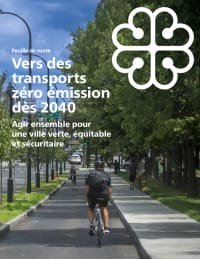Favouring sustainable mobility in Montréal
Walking, biking, public transportation, car sharing and electric vehicles are all ways to reduce the environmental footprint of our travels. To make Montréal a carbon-neutral city by 2050, we must change our transportation habits.
Favouring sustainable mobility in Montréal
Road transportation is currently the leading source of greenhouse gas emissions (GHGs) in Montréal, accounting for about 43 per cent of total emissions.
Moving towards zero emissions transportation by 2040
Montréal has created a roadmap for decarbonizing transportation. Its residents, businesses and key stakeholders are invited to help create a greener city where travel is cleaner and distances are shorter.
What the city plans to do
The city, with its Climate Plan 2020-2030, is committed to doing even more to improve transit and reduce transportation-related GHG emissions within city limits. Specifically, it will:
- Further develop public transit and active transportation and promote car-sharing, taxis and car-pooling in all neighbourhoods.
- Fully electrify the STM bus fleet by 2040.
- Establish tools to facilitate the development of human-scale neighbourhoods adapted to climate change. This will help reduce GHG emissions related to road transportation by 50 per cent.
- Transform large off-street parking lots into green spaces or real estate projects.
- Favour and increase the proportion of electric vehicles in downtown Montréal.
- Establish a zone reserved for electric vehicles in downtown Montréal.
- Increase the number of charging stations and adopt an electrification strategy for public transit so that at least 30 per cent of trips are made by electric modes of transportation.
- Develop a strategy to reduce the carbon footprint of road freight transport so that 25 per cent of deliveries are made with no GHG emissions.
- Decarbonize home-work commutes and business trips of city employees.
What businesses can do
There are many ways in which small, medium or large businesses can take action to reduce their impact in connection with transportation.
As an employer, you can:
- Encourage your employees to adopt more sustainable modes of transportation, for example by contributing financially to their public transit membership programs with Exo and the STM or their active transportation memberships with BIXI
- Facilitate car-pooling by offering matching tools or reserved parking spaces.
- Encourage employees to cycle to work by offering them showers, lockers and safe parking spaces on the work premises.
- Encourage telework and flexible work schedules. A company with 500 employees that allows telework two days a week prevents the production of 161 tonnes of CO2 per year.
- Optimize business travel by encouraging modes of transportation that emit fewer GHGs.
- Encourage virtual meetings
If your company operates a fleet of vehicles, you can:
- Adopt more eco-friendly driving practices, such as having your drivers turn off their engines when stopping to make a delivery.
- Favour vehicles that consume less energy or even delivery on two wheels, to offer greener and more energy-efficient delivery services.
- Electrify your vehicles. The difference in cost associated with purchasing a compact electric vehicle is made up, on average, within four years, through savings on maintenance and fuel.
What residents can do
Montrealers generate an average of 5.5 tonnes of CO2 per person, per year, in large part through our modes of transportation. We all have the power to make a difference in the fight against GHGs by changing our transit habits. For example, you can:
- Opt for public transit, cycling or walking. All are inexpensive, winning choices for the climate. Taking the metro or cycling to work reduces your GHG emissions and allows you to save up to $800 per year compared to travelling by car. And it’s better for your health!
- Choose an electric vehicle if you need to get around by car. While electric cars are more expensive than their gas-powered counterparts, an electric vehicle lets you save in maintenance and fuel costs. In addition, you can get up to $13,000 in federal and provincial subsidies. The climate will thank you for the choice you made: Over a distance of 150,000 km in Québec, a fully electric car will emit 32 fewer tonnes of CO2 than a gas-powered car. In other words, for every 150,000 km, an electric vehicle driven in Québec will emit 65 per cent fewer GHG emissions than its gas-powered equivalent.
Quick search
Need help?
Contact us if you have questions.
Are you sure you want to leave this page?
This page is not available in English. You will be redirected to the English home page.
